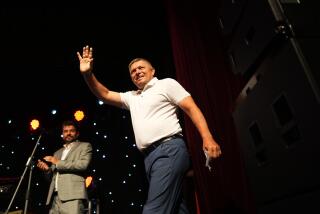Light Shed on Yugoslaviaâs Opposition
BELGRADE, Yugoslavia â Long black hair and beard flowing, Vuk Draskovic ascended to the fourth-floor balcony, raised his arms to the sky and pronounced his call for peaceful revolution to an adoring crowd below.
âDemocratic Serbia will protest!â he cried. âIn the streets, the schools, the universities, the factories, the theaters. . . .â
Draskovic is one of the leaders of an opposition movement thrust suddenly into the international spotlight as the first serious challenge in years to Serbian President Slobodan Milosevic. For the last 12 days, the opposition has led huge demonstrations against Milosevicâs moves to undo its recent victories at the polls.
Yet as products of Serbian politics, the principal leaders of this fledgling opposition have little training in authentic democracy and, in the past, have voiced the same strident nationalism that fueled the bloody disintegration of the former Yugoslav federation.
Their experience and background raise questions about their ability to sustain the anti-Milosevic movement--and to govern should they ever gain power.
Zoran Djindjic, president of the Democratic Party who is quickly emerging as the most capable opposition leader, campaigned on behalf of the political party of indicted war-crimes suspect Radovan Karadzic during September elections in neighboring Bosnia-Herzegovina. And Draskovic formed a paramilitary army in 1991 to battle independence-seeking Croats.
He and Djindjic have renounced violence, but their statements over the years have been contradictory.
The daily protests have been large and impressive.
Tens of thousands marched through Belgrade again Friday, chanting, âLetâs go, all out attack!â and pelting Milosevicâs office building with red paint and eggs.
*
The opposition coalition, known as Zajedno (Together), announced that it will launch a round of labor strikes starting Monday in an effort to widen the movement to include unions and workers.
So far the protests have been dominated by students, pensioners and middle-class professionals. For the opposition to have a significant impact on Milosevicâs leftist authoritarian regime, it must attract blue-collar support, analysts said.
Few observers here expect the opposition to succeed in toppling Milosevic, who is seen by the West as a guarantor of last yearâs Bosnia peace accords.
He retains control over a loyal 80,000-member police force and almost all media. But his decision to annul opposition victories in Nov. 17 municipal elections, which triggered the protests, has seriously damaged his international credibility.
If opposition parties eventually do gain some power on the local level, diplomats fear a period of instability and municipal chaos.
The opposition--largely inexperienced and unskilled in the ways of municipal management--would face a hostile federal government that would make running Yugoslaviaâs cities a nightmare. The federal government would still control state coffers and such crucial resources as heating oil.
Diplomats say one reason Milosevic is so adamantly resisting the sharing of power is that such an arrangement would give opponents a better view of rampant corruption that his cronies allegedly engage in through state-favored companies.
The coalitionâs mandate would be limited politically as well. The ultranationalist Radical Party and Milosevicâs Socialists will continue to control large blocs at the federal and local levels of government.
It is also questionable whether the coalition can remain united.
While the bearded, 50-year-old Draskovic is an emotional symbol and a charismatic firebrand, the handsome, 44-year-old Djindjic is a brainy pragmatist. Political and personality clashes have marked their relationship in the past.
*
Born at the end of World War II to partisans who had fought the German occupation, Draskovic was one of the first proponents of a Greater Serbia, the idea of uniting Serbs throughout the Balkans in a single state.
Draskovic, however, came to reject war, was branded a traitor by Bosnian Serbs and was jailed and badly beaten by Milosevicâs security forces in 1993.
Although the current protests appear to have given him a renewed focus, he has a reputation for flip-flopping on issues.
Djindjic, whose apparent victory in the Belgrade mayoral race this month was annulled by Milosevic, studied in Germany in the 1970s with Marxist intellectuals, landed in legal trouble back home in Yugoslavia because of his student activism, then rose to the leadership of the Democratic Party.
As recently as April 1995, the partyâs platform stated that its main goal was to achieve the âright of the Serbian people for self-determination and unification.â
Unlike Draskovic, Djindjicâs conflicts with Milosevic have involved what he regarded as Milosevicâs abandonment of Serbs in Croatia and Bosnia. He maintained ties to Karadzic and the Bosnian Serbs throughout the war, and he was a frequent guest in Karadzicâs Bosnian headquarters at Pale.
This year he campaigned on behalf of Karadzicâs Serbian Democratic Party, or SDS. At a rally in the Bosnian Serb city of Banja Luka just before Bosniaâs election, he lavished praise on the party.
In an interview Friday, Djindjic defended his actions, saying he supported the SDS because it was running against a slate of Milosevic-backed candidates.
âA victory by Milosevicâs forces [in Bosnia] would have meant a catastrophe,â he said, adding that he and his party attempt to maintain relations with the Bosnian Serbs in order to influence and persuade them to cooperate with the international community.
Djindjicâs nod to nationalism seems to be born of cold political calculation rather than deep-felt sentiment, those who know him said. No politician in Serb-dominated Yugoslavia can succeed without appealing to a sense of nationalism, analysts here said.
âIf I say all that I think, I would quickly disappear from the political scene,â Djindjic is quoted as saying in this weekâs Vreme, a respected newsmagazine.
In fact, the only political party to consistently condemn Serbiaâs warmongering in Bosnia, the Civic Alliance, is weak and ineffectual. Its members have been vilified over the years in the state-run media as traitors.
Times special correspondent Laura Silber in Belgrade contributed to this report.
More to Read
Sign up for Essential California
The most important California stories and recommendations in your inbox every morning.
You may occasionally receive promotional content from the Los Angeles Times.











